This premise is largely the reason the book became a classic in the American canon, because it is interpreted as a cautionary tale and a fable. The moral of the story is that those who keep their heads down will triumph in the end.
Herman Melville
Herman Melville found inspiration for Moby Dick by sailing on a whaler to the Pacific Ocean in 1841–1842. He then went AWOL from his ship and lived among the natives on the Marquesas Islands. After a number of weeks he boarded another whaler and traveled to Honolulu, Hawaii. He eventually returned to the U.S. mainland in 1844.
Melville was displeased at witnessing Christian missionaries in Hawaii forcing their faith on the natives, who had their own beliefs. Although he was a Christian himself, he saw that extreme righteousness was ethically questionable. This was the seed for Moby Dick, which questions the virtues of extreme beliefs.
Before Moby Dick, Melville had published a number of novels alluding to his seagoing adventures, but he never made a great deal of money from any of his work. During the writing of Moby Dick, he became a friend of Nathaniel Hawthorne, to whom he dedicated the book.
Melville spent the remainder of his working life as a customs officer for New York City. By the time he retired, few people remembered his past as an adventurer and novelist. He became an alcoholic, but his wife stuck by him and helped him recover. In sobriety he struggled with bouts of depression until his death at the age of seventy-two. It had been almost forty years since his writing career had ceased, but that hadn’t stopped him from continuing to write for his own pleasure.
In a way Melville’s own journey from adventurer, to novelist, to obscurity is part of the legend. Because he never tasted real success in his own lifetime, it is tempting to wonder what he might now think about the literary legacy he left behind. After all, Moby Dick is now regarded by some as the best American novel ever written.
CONTENTS
Chapter 26: Knights and Squires
Chapter 27: Knights and Squires
